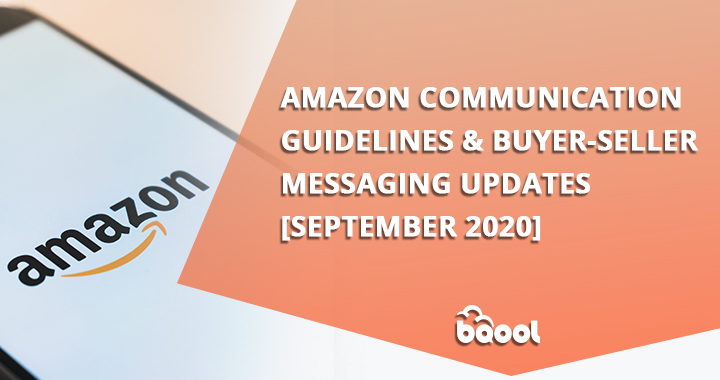Amazon Communication Guidelines Updates

On September 8, 2020, Amazon released its updated Communication Guidelines policy for all sellers, and it’s going to go into effect for Buyer-Seller messages on November 6, 2020. You can find the document about all the details about the updated policy here, or you can go ahead and read this post.
When selling Amazon, sellers communicate with buyers both directly and indirectly. To ensure a safe buying and selling experience, Amazon requires that sellers follow the guidelines below for any communication with buyers. If sellers fail to meet these requirements, it will lead to Amazon limiting proactive Permitted Messages to Amazon’s template or account suspension.
Direct Communication
Order status messages
- Problem with Order messages: Sellers must contact with buyers if their ordered products are not available to be shipped.
- First, sellers must use the reason codes NoInventory or CouldNotShip to adjust the full order amount using Manage Orders or via an Order Adjustment feed.
- Second, use these directions and select the “Problem with Order” option to communicate with the buyer about your inability to fulfill the order.
- The message must include a confirmation that the order amount was adjusted with the appropriate reason for the unavailability of the items.
- If you can fulfill the order but the shipment will be delayed beyond the advertised availability, you must notify the buyer about the delay.
- Do not contact the buyer and request that they submit a cancellation request.
- Return-related messages: Sellers must process refunds for the order amount (minus any charges).
- Use either the Manage Orders or an Order Adjustment feed to process refunds.
- You may communicate with the buyer about their return only when you need additional information to complete the return or a partial refund.
- Follow these directions and select the “Follow-up on return request” option to communicate with the buyer.
Buyer-Seller messages
You may only send Permitted Messages to customers who have contacted you about purchasing a product or who have already purchased a product from you on the Amazon store. Proactive Permitted Message must be sent within 30 days of order completion according to a list of the following reasons:
- Resolving an issue with order fulfillment
- Requesting additional information required to complete the order
- Asking a return-related question
- Sending an invoice
- Requesting product review and/or seller feedback
- Scheduling the delivery of a heavy or bulky item
- Scheduling a Home Services appointment
- Verifying a custom design, or any other reason where the contact is required for the buyer to receive their purchase.
Permitted Messages do NOT include any of the following message types (in many cases Amazon is already emailing customers with this information on your behalf):
- Order or shipping confirmations (See Indirect communication below)
- Messages that say only “Thank you” or that you are here to help if buyers have any problems
- Marketing or promotional messaging, including coupons
- Language that either incentivizes or persuades the buyer to submit positive product reviews or seller feedback, including by offering compensation, money, gift cards, free or discounted products, refunds, rebates or reimbursements, or future benefits
- Language that requests removal or an update of an existing product review
- Language that requests a product review only if they have had a positive experience with the product
- A repeat request (per order) for a product review or seller feedback
Permitted Messages may not include any of the following:
- External links unless they are secure working links (https, not http) necessary for order completion or links to Amazon
- Attachments except for product instructions, warranty information, or invoices
- Logos, if they contain or display a link to your website
- Link to opt-out of messaging
- Sensitive content in images or text (e.g. bare skin, violence/gore, adult/offensive language)
- Tracking pixels or images
- Email addresses or telephone numbers
- Images of purchased products as Amazon includes those on your behalf
- Images that do not relate to your brand or company
- Accessibility issues as specified in the Web Content Accessibility Guidelines from the Web Accessibility Initiative
- Emojis
- GIFs
- Message margins over 20% max width
- Image or graphic sizes larger than 80% max width
- Overrides of Amazon’s default line height, font family, or font color
- Fonts in more than three sizes
- Message bodies that are centered or that otherwise override default text alignment settings
- More than two line-breaks (spacing between paragraphs) in a row
- Unsecure images (http instead of https)
- Spelling errors or grammar issues
Indirect communication
Indirect communication is defined as order-related information that Amazon automatically informs buyers about the shipping and refund information through their “Your Account” updates. These updates are based on shipping confirmations and refunds initiated using Manage Orders or the following feeds:
- Shipping Confirmation feed: This feed tells Amazon that you’ve shipped buyer orders and provides order tracking information for the buyers. Timely communication of order status is an important part of a high-quality shopping experience for Amazon buyers.
- Order Adjustments feed: This feed tells Amazon that you’ve issued buyer refunds. Buyers want to know their refund status when returning products. Therefore, it is critical that you process refunds promptly. You can also use the Manage Returns feature to issue a refund.
While these communication guidelines are good for Amazon shoppers, it can be a headache for sellers to comply with all the details. So if you want to ask for reviews without the risk of account suspension, BigCentral’s Automated Amazon Request a Review Button is your best bet to get reviews and comply with Amazon Communication Guidelines.
Go here to learn more about Amazon communication guidelines for buyer-seller messages.








